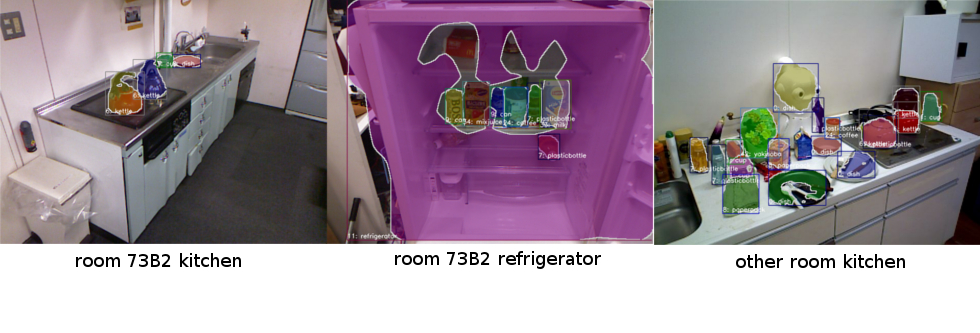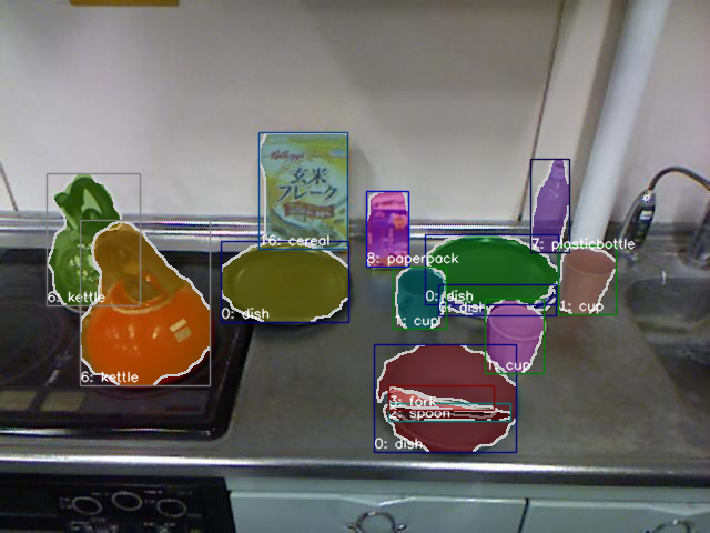Train Mask-RCNN¶
This page shows how to train Mask-RCNN with your own dataset.
Mask-RCNN is a neural network model used for instance segmentation.
Any size of image can be applied to this network as long as your GPU has enough memory.
Available Dataset Class¶
InstanceSegmentationDataset (imported from jsk_recognition_utils.datasets)
This class assumes the following directory structure for each split.
path_to_awesome_dataset/
|-- JPEGImages
| |-- foo.jpg
| |-- bar.jpg
| `-- etc.
|-- SegmentationClass
| |-- foo.npy
| |-- bar.npy
| `-- etc.
|-- SegmentationObject
| |-- foo.npy
| |-- bar.npy
| `-- etc.
|-- class_names.txt
`-- etc.
Arguments¶
--train_dataset_dir(string, default:$(rospack find jsk_perception)/learning_datasets/kitchen_dataset/train)--val_dataset_dir(string, default:$(rospack find jsk_perception)/learning_datasets/kitchen_dataset/test)Directory name which contains dataset for training and validation respectively.
--model_name(string, default:resnet50)Model name. Currently,
vgg16,resnet50andresnet101are supported.--gpu(int, default:0)GPU id.
-1means CPU mode, but we recommend to use GPU for much faster computing.--batch_size(int, default:1)Number of images used simultaneously in each iteration.
You should decrease this number when you face memory allocation error.
--max_epoch(int, default:100)Stop trigger for training.
--lr(float, default:0.00125)Learning rate.
Perhaps you should decrease this number when you face NaN value as loss.
--weight_decay(float, default:0.0001)Weight decay.
--out_dir(string, default:${ROS_HOME}/learning_logs/<timestamp>)Output directory name.
--progressbar_update_interval(float, default:10)Interval for updating progress bar shown while training.
The unit is [iteration].
--print_interval(float, default:100)--print_interval_type(string, default:iteration)Interval for printing information like current epoch, elapsed time, loss, etc. on terminal.
Note that
XXX_interval_typecan be chosen from {’epoch’, ‘iteration’}.--log_interval(float, default:10)--log_interval_type(string, default:iteration)Interval for logging information to
<out_dir>/log.json.--plot_interval(float, default:5)--plot_interval_type(string, default:epoch)Interval for plotting Mean Average Precison to
<out_dir>/accuracy_plot.png, and loss to<out_dir>/loss_plot.png.--eval_interval(float, default:10)--eval_interval_type(string, default:epoch)Interval for running evaluation.
--save_interval(float, default:10)--save_interval_type(string, default:epoch)Interval for saving snapshot of model to
<out_dir>/model_snapshot.npz.Trainer listens to loss for validation dataset according to this interval, and saves snapshot when the loss value becomes minimum.
Output¶
All these files will be automatically generated under <out_dir>.
accuracy_plot.pngfg_class_names.yamllog.jsonloss_plot.pngmodel_snapshot.npznetwork_architecture.dotparams.yaml
Usage¶
rosrun jsk_perception train_mask_rcnn.py [ARGS]
Sample Output¶
There are some pre-trained mask rcnn model on jsk_perception.Getting trained data by build jsk_perception or run script install_trained_data
73b2 kitchen model is some of the typical example of pre-trained mask rcnn model on jsk_perception.The results of mask rcnn using 73b2 kitchen model are as follows.
Sample usage with pre-trained model¶
You can use 73b2 kitchen model with jsk_perception node.
roslaunch jsk_perception sample_mask_rcnn_73b2_kitchen.launch
The result is displayed on the screen as a /mask_rcnn_73b2_kitchen/output/viz topic like below image.

